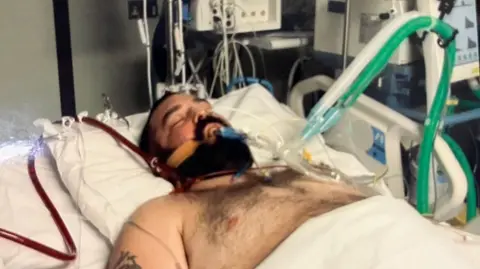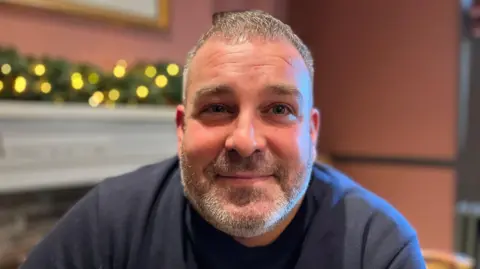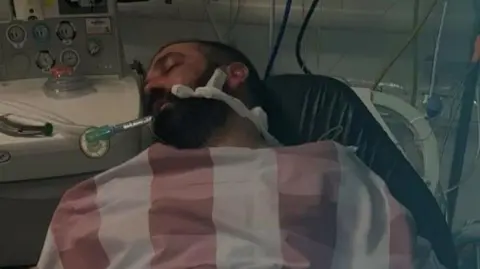Flu left me in a coma and I nearly died twice
 Scott Blackwell
Scott BlackwellA man who was left in a coma and nearly died twice after catching flu says he feels "selfish" for not getting his vaccine.
Scott Blackwell, 44, from Wrexham, was eligible for a flu jab because he has asthma, but forgot to make an appointment.
When he caught flu, he ended up in an induced coma and his family were twice called in to say their last goodbyes, with doctors telling them "you've got half an hour with him, tops".
The mechanical engineer is now backing calls from doctors and the Welsh government for eligible people to get vaccinated for flu and Covid-19.
Mr Blackwell had flu symptoms for a few days before he was found "slumped over a radiator" by a work colleague on New Year's Eve in 2019.
He was rushed to hospital in Wrexham, where it was discovered oxygen was not getting to his brain and he developed serious respiratory problems.
"I'd deteriorated in 15, 20 minutes, from speaking, to struggling with my breathing, to being in a comatose state with a crash team.
"I deteriorated to such a point that my family were called in at 4am, pretty much told 'you're going to say your last goodbyes'," he said.
However, he pulled through and was moved to a hospital in Leicester when a specialist breathing machine became available.
Then his condition worsened again and his family were urged to say goodbye for a second time - but, again, he pulled through.

He said, looking back, "the two weeks in the coma was the easy part really".
Nine months of recovery followed, including learning to walk unaided.
"It was hell if I'm honest. It was awful," he said.
"It makes me feel a bit selfish really because it sucked everybody into that vacuum.
"My family, what I've put my family through, the ordeal they've had to go through.
"And it's not just that ordeal, it's the ordeal afterwards of having to get back into work, because I was off for nine months."
Mr Blackwell said a nurse told him his medication, including ventilation, cost "up to £100,000 a day".
At the time, Mr Blackwell and his partner were busy looking after their two-year-old son and he said he forgot to get his flu jab "because of life".
He added the trauma of his illness was "with me for life now" and urged anyone who qualified for a jab to have it.
"I just feel selfish that I never had it done," he said.
"Nothing's more important."
 Scott Blackwell
Scott BlackwellWales' deputy chief medical officer, Dr Keith Reid, warned people at risk of becoming seriously ill from flu and Covid-19 only have a "short window" to protect themselves before the viruses are in wide circulation - with the peak flu season expected from mid to late December.
He said many people with health conditions which could increase the risk of needing hospital treatment from winter illnesses had not had vaccinations.
Less than 30% of younger adults who are eligible have had a flu jab, compared to 62% of those aged 65 or over.
Dr Reid said people with diabetes could be six times more likely to die from a flu infection than a "healthy person", while people with chronic liver diseases could be up to 48 times more likely to die.
He warned people with some underlying health conditions could be "at significant risk of having a really poor outcome".
"Without vaccination, it could mean serious illness and an emergency admission to hospital.
"We know many young people with conditions like asthma or diabetes haven't got this vital protection yet.
"The peak virus season is close. Now is the time to come forward."
Professor Catherine Moore, director of the Wales National Influenza Centre, added there had been a rise in the number of people had been in hospital with flu complications since the Covid pandemic, "some which could have been prevented by vaccination".
"Sadly, a proportion of these people will die as a result."
How long does flu last for?
The high temperature can last for three to four days but the tiredness can last up to three weeks, according to the NHS.
How to tell if you have the flu
You can tell the difference between a cold and the flu because of the flu appears over a few hours, while a cold appears gradually.
Flu also affects more than just your nose and throat while a cold affects mainly your nose and throat.
If you have the flu you will feel exhausted and too unwell to carry on as normal, but you will feel well enough to do your normal activities if you have a cold, though you will feel unwell.
Can I get rid of flu quickly?
There is no quick way to get rid of flu and the NHS says the illness will normally get better on its own.
However, it says you can get rid of it quicker if you rest and sleep, keep warm, and take paracetamol or ibuprofen to lower your temperature and treat aches and pains. It also says to drink a lot of water to keep hydrated.
For children, they can be given child-suitable paracetamol or ibuprofen if they're distressed or uncomfortable. The NHS says to check with a pharmacist or GP if the packaging does not make this clear.
What are the symptoms of flu?
According to the NHS, flu symptoms come on very quickly and can include:
- a sudden high temperature
- an aching body
- feeling tired or exhausted
- a dry cough
- a sore throat
- a headache
- difficulty sleeping
- loss of appetite
- diarrhoea or tummy pain
- feeling sick and being sick
The symptoms are similar for children, but they can also get pain in their ear and appear less active.
